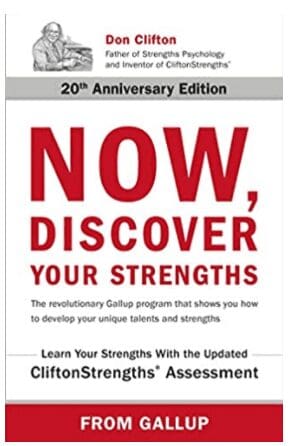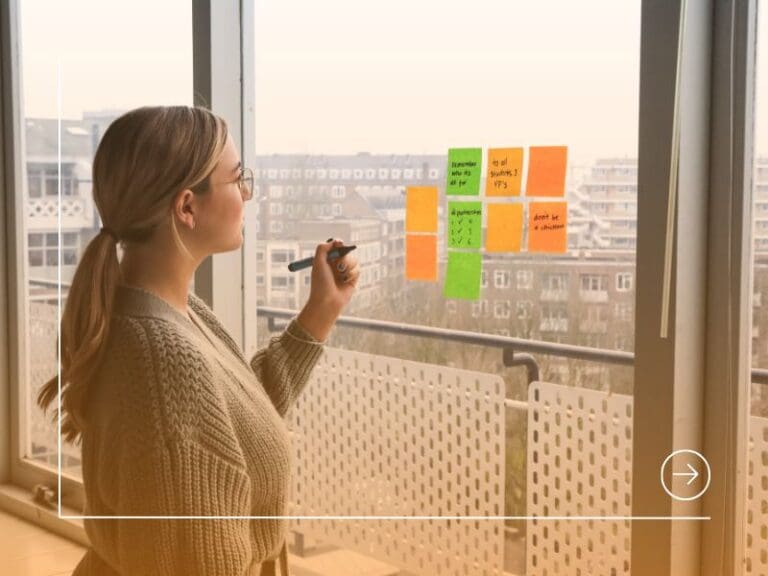
My ex-boss was a so-called natural achiever. He had a constant need for accomplishments. By the end of every day, he had to have something tangible to feel good about himself. And by “every day” I mean every single day — workdays, weekends, and vacations. A vacation was no fun for him unless he was climbing the highest mountain or doing something he could measure.
My friend Nika loves to learn. She’s drawn to the process of learning — more than the content or the result, it’s the process that’s especially exciting for her. She is energized by the steady and deliberate journey from ignorance to competence.
My colleague Miha likes to talk, he values relationships more than anything. Miha wants to understand other people’s feelings, their goals, their fears, and their dreams; and he wants them to understand his. He is a “relator.”
What about you? You might be one of those people who like to think everything through. You might say things like, “Prove it. How can we do this? Show me that what you’re claiming is true.” It’s not that you necessarily want to destroy other people’s ideas, but you insist that their theories be sound. You see yourself as the objective one. You like data because data has no agenda. Armed with data, you search for patterns and connections.
Some of us are natural activators. Once a decision is made we must act. Others may worry that “there are still some things we don’t know,” but this doesn’t slow us down. If the decision has been made to go, we know that the fastest way to get there is to go stoplight to stoplight.
Most developers do not know what their strengths are. When you ask them, they look at you with a blank stare.
I know you’re in lockdown right now but think of your co-workers or the people you used to work with. Have you ever worked with someone:
- Who has great attention to detail and patience?
- Who doesn’t solve a problem with just the code? They believe software products aren’t just the code you write, they’re much more.
- With the willingness to keep learning?
- Who’s a great listener and can explain concepts in a clear and simple manner?
- Who loves to work in a team, who is a pleasure to work with and is adaptable?
- Who writes elegant code that can be easily maintained?
- A team leader who inspires and motivates their team?
- Who has a constant drive to be better, to do better?
- Who is super analytical and understands solutions on multiple levels? Who sees the pros and cons of every approach?
- Who pushes to get the job done?
Everyone has their own strengths. One person’s strength lies in strategic thinking, another excels in relationship building. Some people are natural-born influencers and others are best at executing and achieving. Finding your strengths can help you in the long run.
I recently read a book that made a big impression on me. It helped me find my strengths and it helped me focus on my talents so that I can enjoy my work better. Instead of trying to be something I’m not, I’m able to be more productive, do the stuff I’m really good at, and get better results.
The book is “Now, Discover Your Strengths” from the Gallup company:

These are the key takeaways from the book. You can use it to grow as an individual or to better manage your team by developing their strengths. “Now, Discover Your Strengths” will help you to identify your unique strengths and then use those strengths to improve yourself and those you manage.
Unfortunately, most of us have little sense of our talents and strengths, much less the ability to build our lives around them. Instead, guided by our parents, teachers, managers, and by psychology’s fascination with pathology, we become experts in our weaknesses and spend our lives trying to repair these flaws, while our strengths are sleeping and are being neglected.
Each person’s talents are enduring and unique.
Each person’s greatest potential for growth is in the area of his or her greatest strength.
As an organization or as an individual you can:
- Reach your maximum potential only by using your individual strengths.
- Match your strengths to your roles at work, home and in the community.
- Enjoy what you are doing because you are using your true talents.
When you exploit your natural abilities, you can’t help but succeed.
We spend too much time focusing on our weaknesses and trying to make them stronger, rather than recognizing our strengths and trying to capitalize on them.
Companies make two incorrect assumptions:
- That a person can become competent at anything if they are trained properly, so they spend a lot of time training their workforce.
- They assume the greatest areas of “opportunity” or growth are in an employee’s area of greatest weakness. Therefore the development plan for an employee will often focus on these areas of weakness.
“Now, Discover Your Strengths” proposes we assume the following:
- That each person’s talents are enduring and unique (people were born with them and will always have them).
- That each person’s greatest room for growth is in their area of greatest strength.
What is a Strength?
“Now, Discover Your Strengths” defines strength as consistent near-perfect performance in an activity. For something to be a strength, you must be able to do it consistently and predictably.
People excel by maximizing strengths, not by fixing their weaknesses. One exception is that a fatal weakness must be addressed.
You can also learn to manage your weaknesses. An example would be a manager hiring someone who has great attention to detail since they know it’s something they lack and it’s needed for the team they manage.
If your weaknesses lay in the field of communicating, listening, or organization, they will be obstacles that prevent you from reaching your goals.
What is strength? The book defines it like this:
Strength = Talent + Knowledge + Skills
Let’s review each component.
- TALENTS are naturally recurring patterns of thought, feeling or behavior that can be productively applied. Usually, talents come so easily to us that we don’t even recognize them as talents. We assume everyone can do the same things.
- KNOWLEDGE consists of all the facts and lessons learned along the way.
- SKILLS are the steps of an activity. Skills bring structure to experiential knowledge.
Skills help you perform but not necessarily excel. For example, you may learn some of the basic steps of public speaking and even become a better public speaker than you were before. But without the natural talent, you will never be great at it.
A person cannot have strength without having the requisite talent. You may develop the knowledge and skills to get by, but without the talent, you won’t be able to achieve consistent, near-perfect performance.
The key to building a strength is to first identify your dominant talents, then refine them with knowledge and skills.
For example, if you sign up for classes on leadership or assertiveness or public speaking, you will not see dramatic improvement unless you have the natural talent for one of these. This is diverting your energy towards damage control and not toward real development.
Every day there are hundreds of small decisions to make. We’re unable to intellectualize every little decision, so we react instinctively. This means our brain takes the quickest path to make the decision, which results in using your natural talents to make these smaller decisions. These smaller decisions ultimately add up to a person’s performance for the day, then the week, then the year.
Even skills training classes that are followed up with ongoing support after the training, will not be fruitful without a person having a natural talent.
Talents not only come naturally to us but they also feel good to us. It feels natural to use them, it feels good to use them. This is constantly pushing us towards using our talents again and again.

How Do I Discover My Talents?
Here is what you can do to discover your talents:
- Monitor your spontaneous, top‐of‐mind reactions to the situations you come across.
Also, monitor these three things:
- Activities you’re naturally drawn to, particularly at a young age. You may not have a strong desire to cultivate them because you’re busy doing other things, but they will keep calling out to you.
- An ability to rapidly learn a new skill will give you clues to where your talents lie.
- What are your satisfactions? What feels good when you’re doing it? If doing something makes you feel really good or satisfied, that might be your natural talent. Obviously this applies to productive behaviors only, as the definition of talent implies — we’re definitely not talking about drugs, alcohol and other destructive activities!
The best way to find your talents is to monitor your behavior and feelings over an extended period of time. Or, you can take this online assessment test. The test identifies 34 different areas of talent and gives you your top five areas.
How Do I Manage My Weaknesses?
Weakness is anything that gets in the way of excellent performance.
The absence of any of the themes the book identifies, is not a weakness. You do not need that theme to be successful in work or life. It becomes a weakness only when you find yourself in a role that requires you to play to one of your non‐talents.
First, identify if the weakness is a skills weakness, a knowledge weakness, or a talent weakness. If it’s hard to figure this out, go acquire the skills and knowledge you need in a certain area. If your performance is still not great, then you probably lack the talent.
Here are other strategies for dealing with a weakness:
- Get a little better at communicating, listening and organization. You need some level of ability in these areas or they will undermine your real strengths.
- Design a support system and find ways to diminish this weakness. For example, you can organize short meetings if you have a short attention span. Or you can surround yourself with people that possess the strengths you lack.
- Use one of your strengths to overcome your weakness.
- Find a partner with complementary themes of talent. For example, an entrepreneur with no touch for numbers might team up with a skilled accountant to fill that weakness. It takes a strong person to admit a weakness in themselves.
- To just stop doing it is the strategy of last resort, but effective if needed. If you stop doing something you’re not good at it’s possible nobody will notice or care. It’s possible that you earn more respect. And it’s possible you’ll feel better about yourself.
On this final point — I once worked with a guy who was a great developer. He could solve problems so much faster than the rest of us. The only thing that got in his way was that he could not explain anything in a simple way. You could just see it in his face — he considered the others a little bit stupid. His explanations were more mumbling than anything else. After many failed conversations the owners of the company simply decided he should only work on standalone projects. Projects that needed very little cooperation with others. Now he was happy — he sat in his corner, doing his thing. Unfortunately, he did not realize that by improving his communication skills he might be more respected, get a higher salary, and do the job better.
I once knew a team leader who lacked empathy. He was the achiever. He pushed and commanded everyone around. People said yes to him, just to get him off their back, but it always backfired. Finally, he told us and asked us to just simply tell him if he was too pushy. He still occasionally behaved like a jerk, but we politely told him and he took our remarks as a positive thing. That for me is a remarkable quality — to be able to admit your flaws and be ready to listen to other people. Respect!
Quick Summary
- Each person’s talents are enduring and unique.
- Each person’s greatest room for growth is in their area of greatest strength.
- When you exploit your natural abilities, you can’t help but succeed.
- The absence of strength becomes a weakness only when you find yourself in a role that requires you to play to one of your non‐talents.








